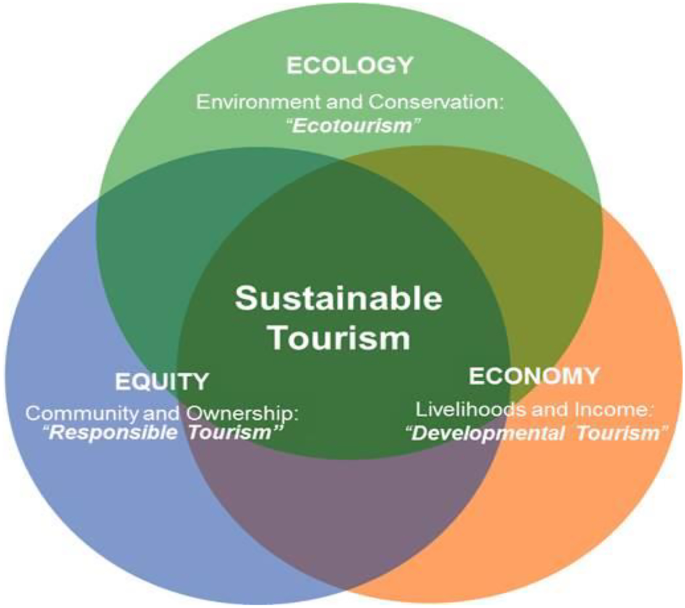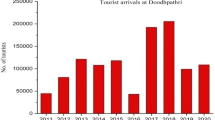Abstract
Tourism has a great potential to change the structure of the economy both in developed and develo** countries. Tourism development in a region has both pros and cons for local communities. On one side, it boosting up economic growth and provide various facilities to the locals. On the other side, it is creating many negative externalities such as the communities are expected to agonize from traffic jams, crowding, increasing the crime rate, destruction of the environment and natural resources, and most prominently disturbed the community’s norms and culture. The main objective of this study is to explore the perception of local community regarding socio-economic, environmental, and cultural impact of tourism. The secondary objective of the study is to evaluate the local community participation in tourism development. To accomplish these objectives, primary data has been collected from 305 respondents in Skardu, Gilgit Baltistan, Pakistan, through questionnaire. For empirical analysis, the study used varimax-rotated matrix. Results reveal that tourism activities in the region of Gilgit Baltistan improve the economic status of the members of the local community. However, tourism negatively affects the natural environment of the region and disturbed the community’s norms and culture. The local government should provide incentives to the local people and involve them in developmental decision to update their lifestyle. The findings of the study also provide insight to the tourist not to involve in unethical activities which can destroy the local norms and culture. The study also provides suggestions to the local people to cooperate and host the tourists in a better way so that they come again and again.
Graphic Abstract






Similar content being viewed by others
Availability of Data and Materials
The authors collected primary data and will be provided on request.
References
Aall, C., Klepp, I. G., Engeset, A. B., Skuland, S. E., & Støa, E. (2011). Leisure and sustainable development in Norway: part of the solution and the problem. Leisure Studies, 30(4), 453-476.
Adnan Hye, Q. M., & Ali Khan, R. E. (2013). Tourism-led growth hypothesis: A case study of Pakistan. Asia Pacific Journal of Tourism Research, 18(4), 303–313. https://doi.org/10.1080/10941665.2012.658412
Ahn, B., Lee, B., & Shafer, C. S. (2002). Operationalising sustainability in regional tourism planning: An application of the limits of acceptable change framework. Tourism Management, 23, 1–15. https://doi.org/10.1016/S0261-5177(01)00059-0
Almeida-García, F., Peláez-Fernández, M. Á., Balbuena-Vázquez, A., & Cortés-Macias, R. (2016). Residents’ perceptions of tourism development in Benalmádena (Spain). Tourism Management, 54, 259–274. https://doi.org/10.1016/j.tourman.2015.11.007
Alshuwaikhat, H. M. (2005). Strategic environmental assessment can help solve environmental impact assessment failures in develo** countries. Environmental Impact Assessment Review, 25(4), 307–317. https://doi.org/10.1016/j.eiar.2004.09.003
Andereck, K. L., & Nyaupane, G. P. (2011). Exploring the nature of tourism and quality of life perceptions among residents. Journal of Travel Research, 50(3), 248–260. https://doi.org/10.1177/2F0047287510362918
Andereck, K. L., Valentine, K. M., Knopf, R. C., & Vogt, C. A. (2005). Residents’ perceptions of community tourism impacts. Annals of Tourism Research, 32(4), 1056-1076.
Baloch, Q. B. (2007). Managing tourism in Pakistan: A case study of Chitral valley. Journal of Managerial Sciences, 2(2), 169–190. http://www.academia.edu/download/38364352/01_qadar_bakhsh.pdf
Buckley, R. (2012). Sustainable tourism: Research and reality. Annals of Tourism Research, 39(2), 528–546. https://doi.org/10.1016/j.annals.2012.02.003
Chang, S. C., & Lee, M. S. (2008). The linkage between knowledge accumulation capability and organizational innovation. Journal of Knowledge Management. https://doi.org/10.1108/13673270810852359
Charara, N., Cashman, A., Bonnell, R., & Gehr, R. (2011). Water use efficiency in the hotel sector of Barbados. Journal of Sustainable Tourism, 19(2), 231–245. https://doi.org/10.1080/09669582.2010.502577
Crotti, R., & Misrahi, T. (2017). The travel & tourism competitiveness report 2017. Paving the way for a more sustainable and inclusive future. In World Economic Forum: Geneva, Switzerland (p. 2017). https://www.weforum.org/reports/the-travel-tourism-competitiveness-report-2017
Diedrich, A., & García-Buades, E. (2009). Local perceptions of tourism as indicators of destination decline. Tourism Management, 30(4), 512–521. https://doi.org/10.1016/j.tourman.2008.10.009
Ferreira, F. A., Castro, C., & Gomes, A. S. (2020, October). Positive and negative social-cultural, economic and environmental impacts of tourism on residents. In International Conference on Tourism, Technology and Systems (pp. 288–298). Springer, Singapore.
Garau-Vadell, J. B., Gutierrez-Taño, D., & Diaz-Armas, R. (2018). Economic crisis and residents’ perception of the impacts of tourism in mass tourism destinations. Journal of Destination Marketing & Management, 7, 68–75. https://doi.org/10.1016/j.jdmm.2016.08.008
Goleldner, C., Ritchie, B., & McIntosh, R. (2000). Tourism–Principles, Practices, Philosophies, New York: J. Willey & Sons. http://www.semesteratsea.org/wp-content/uploads/sas_courses/Huijbens_NRRT270_Natural_Resource_Tourism_Syllabus.pdf
Gössling, S. (2002). Global environmental consequences of tourism. Global Environmental Change, 12(4), 283-302.
Gumus, F., Eskin, I., Veznikli, A. N., & Gumus, M. (2007). Availability of rural tourism for Gallipoli villages: the potentials and attitudes. International Tourism Biennial conference, Turkey, 157.
Harrill, R., & Potts, T. D. (2003). Tourism planning in historic districts: Attitudes toward tourism development in Charleston. Journal of the American Planning Association, 69(3), 233–244.
Khalil, S., Kakar, M. K., & Malik, A. (2007). Role of tourism in economic growth: Empirical evidence from Pakistan economy [with comments]. The Pakistan Development Review, 985–995.
Ko, D. W., & Stewart, W. P. (2002). A structural equation model of residents’ attitudes for tourism development. Tourism Management, 23(5), 521–530.
Lindberg, K., & Johnson, R. L. (1997). Modeling resident attitudes toward tourism. Annals of Tourism Research, 24(2), 402-424.
Linderová, I., Scholz, P., & Almeida, N. (2021). Attitudes of local population towards the impacts of tourism development: Evidence from Czechia. Frontiers in Psychology, 12, 684773. https://doi.org/10.3389/fpsyg.2021.684773
Liu, H. (2020). The socio-economic impacts of tourism development in Sierra Leone: A pilot study. European Business & Management, 6(6), 128.
McCool, S. F., Moisey, R. N., & Nickerson, N. P. (2001). What should tourism sustain? The disconnect with industry perceptions of useful indicators. Journal of Travel Research, 40(4), 124–131.
Nunkoo, R., & Ramkissoon, H. (2009). Small island urban tourism: A residents’ perspective., Routledge, 13(1), 37–60.
Nunkoo, R., & Ramkissoon, H. (2011). Develo** a community support model for tourism. Annals of Tourism Research, 38(3), 964–988.
Rana, S. (2015). High-involvement work practices and employee engagement. Human Resource Development International, 18(3), 308–316.
Sadiq, M., Othman, Z., & Keong, O. C. (2019). A study of interaction effects of political influences and earnings management on organisational performance. Asian Economic and Financial Review, 9(5), 642-653.
Shujahi, A. H., & Hussain, A. (2016). Economic and environmental costs of tourism: Evidence from District Abbottabad. Islamabad: Pakistan Institute of Development Economics (PIDE).
Sinclair, M. T. (1998). Tourism and economic development: A survey. The Journal of Development Studies, 34(5), 1–51.
Snaith, T., & Haley, A. J. (1999). Residents’ opinion of tourism development in the historic city of York. England. Tourism Management, 20(1), 595–603.
Sofronov, B. (2017). The economic impact on global tourism. Annals of Spiru Haret University. Economic Series, 17(2), 127–139.
Sunlu, U. (2003). Environmental impacts of tourism. In Conference on the Relationships between Global Trades and Local Resources in the Mediterranean Region (pp. 263–270).
Tosun, C. (2002). Host perceptions of impacts: A comparative tourism study. Annals of Tourism Research, 29(1), 231–253.
Twining-Ward, L., & Butler, R. (2002). Implementing STD on a small island: Development and use of sustainable tourism development indicators in Samoa. Journal of Sustainable Tourism, 10(5), 363–387.
Wall, G., & Mathieson, A. (2006). Tourism: Change, impacts, and opportunities. Pearson Education.
Author information
Authors and Affiliations
Corresponding author
Ethics declarations
Ethics Approval
The ethical issues, including plagiarism, informed consent, misconduct, data fabrication and/or falsification, double publication and/or submission, and redundancy have been completely observed by the authors.
Consent for Publication
Not applicable.
Competing Interests
The authors declare no competing interests.
Additional information
Publisher's Note
Springer Nature remains neutral with regard to jurisdictional claims in published maps and institutional affiliations.
Appendix
Appendix


Rights and permissions
About this article
Cite this article
Jehan, Y., Batool, M., Hayat, N. et al. Socio-Economic and Environmental Impacts of Tourism on Local Community in Gilgit Baltistan, Pakistan: a Local Community Prospective. J Knowl Econ 14, 180–199 (2023). https://doi.org/10.1007/s13132-021-00885-9
Received:
Accepted:
Published:
Issue Date:
DOI: https://doi.org/10.1007/s13132-021-00885-9




